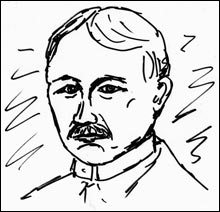Scientific Management
Scientific management, otherwise known as the machine model, places major emphasis on efficiency, orderliness and output. Often referred to as the Father of Scientific Management, Frederick Winslow Taylor (1856-1915) was born the son of well-to-do Quaker parents in Philadelphia, Pennsylvania. After dropping out of Harvard University because of poor vision, he began working as a patternmaker, gaining experience as a laborer. He eventually earned a mechanical engineering degree through correspondence courses with the Stevens Institute of Technology. He went on to become a professor at the Tuck School of Business at Dartmouth College.

Frederick Winslow Taylor
He believed that industrial management of time was very inefficient. He posited that management should be expressed as an academic discipline, and that optimum outcome could only be achieved by means of a partnership between well-trained and educated managers and a supportive and inventive workforce. He believed that management and labor needed each other, and that they could work in harmony devoid of trade unions.
Taylor established four basic principles for this approach to scientific management: division of labor, unity of command, one-way authority, and narrow span of control. This bureaucratic model dovetailed nicely with the existing paramilitary police organizations.
O.W. Wilson and William H. Parker are two of the early leaders in police administration. Both Wilson and Parker rose through the ranks to become chiefs of their respective departments. Both Wilson and Parker were also heavily influence by their time and experiences in the U.S. military during World War II. Wilson authored what has often been hailed as the seminal work entitled, Police Administration (1950). Although no longer in use, it was extremely influential during its time.
As leader of the Los Angeles Police Department from 1950-1968, Parker was a leader in police innovation and led the way demanding education, psychiatric exams, and probationary periods for new officers. He is also responsible for creating a file examining the methods used by criminals (modus operandi), research and planning divisions, and other procedures that led the way for departments across the United States.
